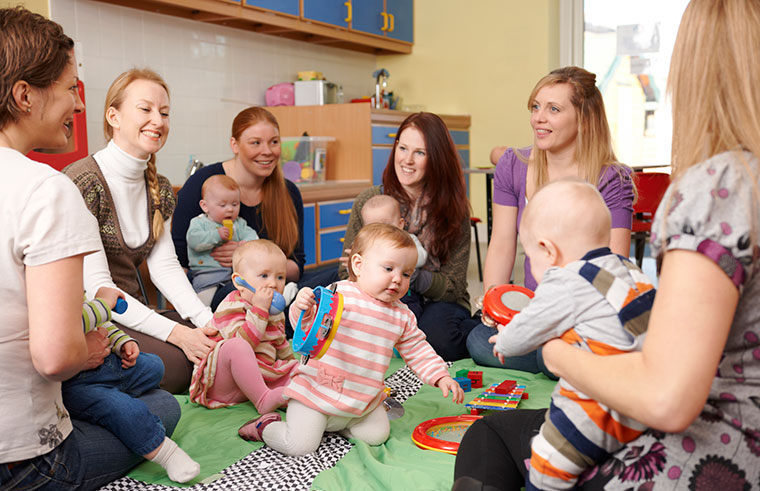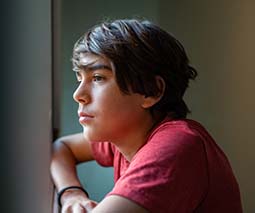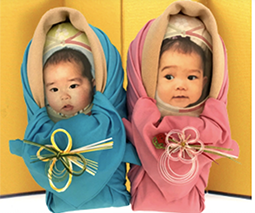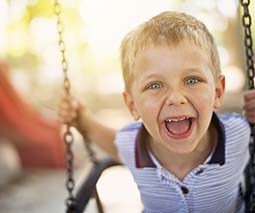How parenting became a competitive sport

These days, parenting seems to have become a competitive sport, with people bragging about children’s achievements and continuously comparing them to others.
Michael Grose, author, parenting educator and founder of Parenting Ideas, talks about dealing with the many politics of parenting, while still trying to do the very best for our children.
Listen to Michael Grose on Feed Play Love:
Look at my child!
Naturally, we feel chuffed when our kids do something clever or reach a milestone early; however, this has created a competitive environment, with parents trying to outdo each other. “I think it gets political from an early age,” says Michael. “It’s the notion that we all like to do well at the things we do, and probably parenting is no different. We want to be seen to be doing a good job as parents.”
According to Michael, our children’s developments and milestones have become our benchmarks, which adds pressure to parenting, and sets us up for disappointment. “Also what’s tied in with it is the fact that we only have small families,” he says. “We put a lot of pressure on ourselves and, as I often say, if we had six kids, you’ll get one good one.”
Am I doing it right?
Bragging about kids also comes down to parents’ insecurity and an attempt to justify their choices. “There’s so much knowledge out there and there’s so many ways of going about raising kids.”
Michael also believes that in previous generations, what parents wanted was to be comfortable, whereas today it’s more about gaining the best possible outcomes for our kids, which is wonderful but again puts pressure on us. “Also, I think inadvertently, it puts pressure on kids as well because when we’re striving for the very best outcomes for our kids, our kids feel that in some ways and they have their own developmental clock, which is why the whole notion of comparisons can be fraught with danger,” says Michael.
“The trick is if you can actually just focus on your own child, focus on their strengths, which is easier said than done in this competitive world that we live in.”
Whose hopes and dreams?
Naturally, as parents, we want to guide our kids as best we can; however, sometimes this becomes a projection of our own hopes and desires. “We all have hopes and dreams as parents and they sort of go on the shoulders of kids and they certainly go on the shoulders of the firstborns,” says Michael. “If the family is an academic family, there’s a fair chance the firstborn will be academic because of those expectations, and of course, when we’ve got small families the expectations tend to be very much there.
“If you go back to the mythical six kids, by the time you get down to the sixth, the expectations have been watered down and that’s one of the reasons why often the youngest child in the family will outdo the others or will be successful in a completely different field.”
The right encouragement
Michael suggests looking at what your child likes to do and being guided by that. “My advice is always to try to work out what your kid’s strengths are and their interests,” he says. “That can be hard if you’re very much an academic type person yourself and suddenly you see their interests in school aren’t academic.”
But is it ever appropriate to step in and give your child a little push? Especially when we see other people’s kids achieving around us?
“One of the things we’ve got to look at is kids will often let us know,” says Michael. “There’s that aspect of looking around, but also you’ve got to see if your child is really struggling, then they may need assistance.”
“Obviously if your child’s not walking by a certain age or if your child’s not picking up speech by a certain age, then you need to look at if there are any issues,” continues Michael. “Start looking at those extremes, if your child’s not doing something when most of the others are, and I always use 85 percent, if 85 percent of kids tend to be doing something or other, and my child isn’t, then maybe there are some issues.”
Understanding parents’ ego
Most parents like to have a facade that says all is going well and that their children are overachievers, while in fact, the opposite could be true. “There’s a lot of ego involved in parenting,” says Michael. “I’ve been doing this for 25 years and one of the things that you often find is that people will put up a front, but we don’t know what’s happening behind closed doors and behind closed doors, there’s a lot of a struggle. In some ways it’s a ‘Facebook effect’ or the comparison effect; we’re almost trained to compare ourselves to each other.”
Michael’s final piece of advice says it all: “Be a bit sceptical when someone says, ‘Oh my child’s playing the violin at seven.’”













